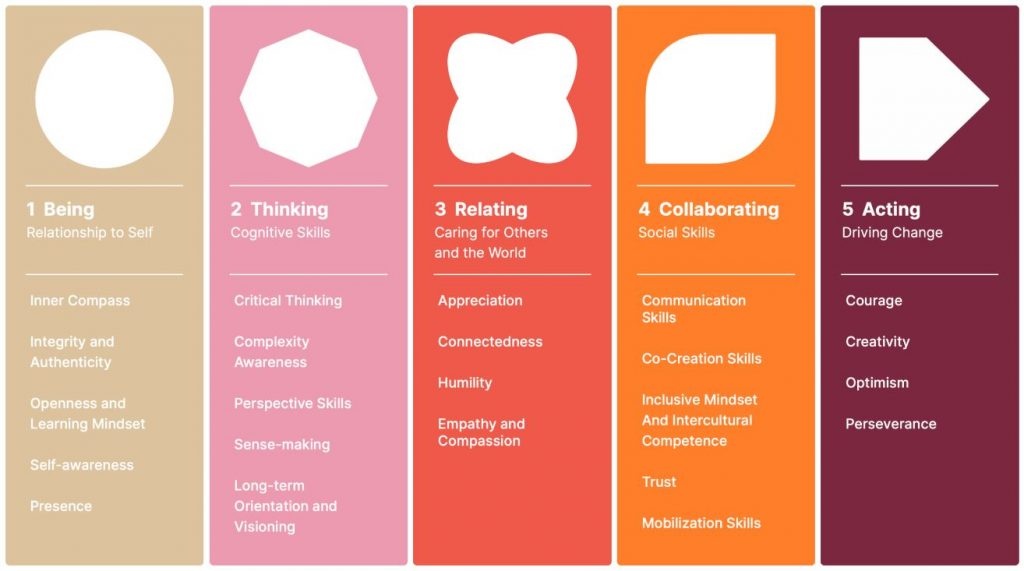The Inner Development Goals Framework is a powerful tool for leaders, HR managers, and learning & development professionals to help individuals and teams achieve their full potential. This framework focuses on developing the inner capacities that are the essential foundation for success.
The Inner Development Goals (or IDGs for short) are a list of 23 capacities that can help society to overcome complex problems. They were developed by asking academic researchers, business professionals and educators what skills they most felt society needed in order to achieve the 17 Sustainable Development Goals.
The 23 IDGs have been organised into five categories:
1) Being – Relationship to self: Cultivating our inner life and developing and deepening our relationship to our thoughts, feelings and body help us be present, intentional and non-reactive when we face complexity.
2) Thinking – Cognitive Skills: Developing our cognitive skills by taking different perspectives, evaluating information and making sense of the world as an interconnected whole is essential for wise decision-making.
3) Relating – Caring for Others and the World: Appreciating, caring for and feeling connected to others, such as neighbours, future generations or the biosphere, helps us create more just and sustainable systems and societies for everyone.
4) Collaborating – Social Skills: To make progress on shared concerns, we need to develop our abilities to include, hold space and communicate with stakeholders with different values, skills and competencies.
5) Acting – Driving change: Qualities such as courage and optimism help us acquire true agency, break old patterns, generate original ideas and act with persistence in uncertain times.
Read more about the creation of the framework in the report.

The Inner Development Goals help individuals and teams to develop a strong sense of self-awareness. The explicit framework helps people to identify and understand their strengths, weaknesses, and areas for improvement. This self-awareness is essential for leaders, as it allows them to make better decisions and lead with greater effectiveness.
Emotional intelligence is the ability to understand and manage one’s own emotions, as well as being sensitive to the emotions of others. Many modern leadership experts (Daniel Goleman, Brené Brown, Adam Grant, Simon Sinek) believe that emotional intelligence may be even more important than traditional intelligence. This is because it helps leaders to create a positive and productive work environment, to communicate effectively, and to build strong relationships with their team members.
It is important for everyone to continue to grow in their personal and professional development over their lifetime. Working with a tangible framework like the IDGs helps individuals to identify areas of improvement, track their progress and work in an intentional way to develop their inner capacities. The IDG founders are working on a field toolkit to help people with their development.
In addition to these benefits, the Inner Development Goals Framework also helps individuals and teams to develop other important positive practices such as mindfulness, compassion, and positive thinking. These are known to strengthen relationships and improve wellbeing.
The IDGs framework can be a perfect addition to your individual and team personal development plans. Get your team members to self-assess their strengths and areas for development in each of the 23 capacities. Then use this to form an action plan with specific goals for capacity growth as well as the steps that need to be taken to achieve these goals. The plan should also include regular check-ins and progress reports to ensure that individuals and teams are on track to achieve their goals.
Doing a team assessment may highlight that certain capacities could do with a boost. Investing in workshops, seminars or one-on-one coaching can be a great way to strengthen capacities in your team.
Having a positive and healthy culture has a huge impact on employee wellbeing, retention and performance. Use the IDGs as a common language to encourage a culture of continuous learning and development within your organisation. This may include providing regular development opportunities, giving people ‘development time’ as part of their working week and recognising and rewarding employees who demonstrate progress in their inner development.
Rather than focusing at an individual or team level, you can map the IDGs to your organisation’s vision and operation. Which capacities does your organisation need to do well to fulfil it’s aims? Which capacities do you want to ‘shout about’ to clients? Use the IDGs to support your organisation’s messaging and brand identity.
Whichever way you look at it, working on your inner development is crucial in achieving success, both in personal and professional life. It is important for leaders, HR managers and those in learning and development to both value inner development in the workplace and have the mechanisms for effectively nurturing it. The Inner Development Goals framework is a comprehensively researched and easy to use model that can help leaders to cultivate self-awareness, emotional intelligence and resilience in their teams. This will ultimately lead to positive and productive work environments where individuals can achieve their full potential.
If you’d like support in using the Inner Development Goals with your team then The Self Leadership Initiative can help. The SLI provides personal development workshops and coaching services to help teams reach their full potential. Book in a FREE 30 minute chat with Founder Gemma Perkins to discuss your team’s needs today.